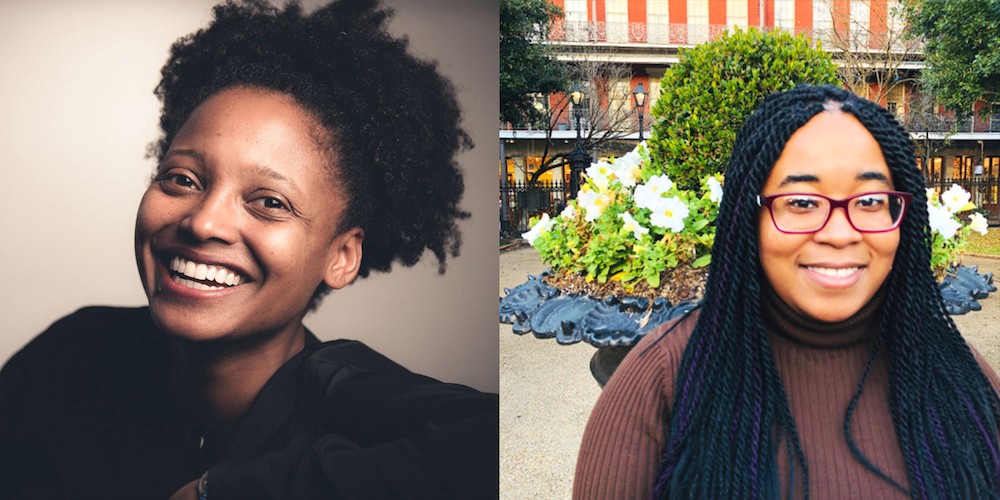'Translating Identity': A Panel on Translation, Race, and Gender with Tracy K. Smith '97 and Paige Morris
Our Word recently hosted poet Tracy K. Smith '97 and fiction writer Paige Morris for a panel on translation, race, and gender called “Translating Identity.” Our Word is a student organization whose mission is to enrich the Columbia University School of the Arts, and the literary community in general, with outreach, advocacy, and inclusion of new and old literary voices. In addition to hosting panels and readings, the organization builds community by hosting workshops, social events on and off campus, and a Writer-in-Residence.
Smith is the author of the memoir Ordinary Light and four books of poetry, including Life on Mars, which received the 2012 Pulitzer Prize. In June 2017, she was named the 22nd US Poet Laureate Consultant in Poetry by the Library of Congress, and in March 2018 she was re-appointed to a second term for 2018-19. She is also the Chair of the Lewis Center for the Arts at Princeton University, as well as the Roger S. Berlind ’52 Professor of the Humanities.
Morris is a writer and Korean-English translator from Jersey City, NJ, now based in South Korea. She holds BAs in Ethnic Studies and Literary Arts from Brown University and an MFA in Creative Writing from Rutgers University-Newark. The recipient of awards from the Fulbright Program and the American Literary Translators Association, her writing and translations have appeared or are forthcoming in The Margins,The Rumpus, Strange Horizons, Nabillera, Necessary Fiction, and more.
Over 50 people attended the event, which was hosted by poetry student Stephanie Dinsae. Known for her poetry, Smith’s most recent work has been in co-translating the poems of Yi Lei, one of the most influential figures of Chinese poetry, with Changtai Bi. “This translation practice, for me, goes back maybe five or six years now, and while it comes out of a friendship, the culmination of this book coincides with a realization that the community that I have belonged to, which is rooted in whiteness as an ivy league institution, isn’t enough. I love the resourcefulness of saying, there are other spaces where we exist and are necessary.” Dinsae shares the same impulse to find and foster community in the field of translation. In addition to conversations and panels like these, that work of community comes through for Dinsae in her own writing: “I’m really interested in creating community around ourselves, and one of the ways in which I do that is through some of my poetry. Taking these Greco-Roman stories and figuring out where I can enter those stories, in my own life and the communities I’m part of.”
The panelists also touched upon the difficulties of navigating the field of translation as a space historically dominated by white men, and how each of them have struggled with a certain reluctance and difficulty to claim the title of translator. “I also didn’t call myself a translator until this year," Morris shared. "That was only possible for me because I had possibility models—a term I learned from Laverne Cox—for people of color who are translators. People who are not white men who are experts on language and who can claim that for themselves and be recognized as such.” In her own work, Morris translates from Korean into English, and the process, as she described it, is a multifaceted one: “I work from Korean, which is a complicated language to work from as a Black translator because, in some ways, I come to it with the power of my English-speaking background, bringing this language into English. It’s also a language that has been colonized and has a history of having been policed in the same way that my Black English has been policed.”
At the end of the event, Dinsae asked the panelists to share something they know about translation now that they wish they had known before. “I wish that I understood that the same way that writing is a private act that later becomes public, that’s what translation is also,” Smith said. “I think I had been intimidated from this feeling that everyone would be watching and judging me, what business did I have doing this. But the experience of living in another poet’s world is so beautiful...it’s an opportunity that we should really leap at.”
While Morris also finds the connections between writing and translation meaningful, she believes their differences also hold important weight: “I think it would have been good for me to realize and sit with the fact that these are different muscles...I wish I had known how to better balance the two. How to continue writing while translating and to see the necessity of both and give both equal energy and weight.”
Smith’s books are available for purchase through Bookshop. You can also read an excerpt of Morris' upcoming translation of Love at the Harbor by Kim Sehee here. Visit Our Word’s webpage to find further information about the organization and their upcoming events.
